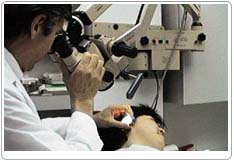What is it?
There is something wrong with your voice or throat. The problem lies in your larynx or voice box. The larynx fits inside your Adam's apple at the top of your windpipe. Inside your larynx, the vocal cords make your voice. They are not really cords. They look more like the sliding doors at the entrance to a supermarket. They fit across the top of your wind pipe. If the cords are held open by the muscles in your larynx, air will pass in and out of your windpipe for normal, quiet breathing. If the cords are pulled nearly shut by the muscles as you breathe out, the edges of the cords vibrate. This makes a sound - your voice. If the cords are completely shut, as you breathe out, and then you open the cords suddenly, this is a cough. If the cords are lumpy and do not fit together well, your voice and your cough will be weak.
 You have probably had an examination with a mirror looking down your throat in the outpatient department. This is called an indirect laryngoscopy. This did not give all the information that was needed. The surgeon now needs to have a closer look inside your larynx to find out exactly what is wrong. Usual indications for laryngoscopy are voice problems (such as weak or hoarse voice), unexplained throat pain, difficulties in swallowing, injuries in the area of the voice box or suspicion that there is a lump or a foreign body in the voice box.
You have probably had an examination with a mirror looking down your throat in the outpatient department. This is called an indirect laryngoscopy. This did not give all the information that was needed. The surgeon now needs to have a closer look inside your larynx to find out exactly what is wrong. Usual indications for laryngoscopy are voice problems (such as weak or hoarse voice), unexplained throat pain, difficulties in swallowing, injuries in the area of the voice box or suspicion that there is a lump or a foreign body in the voice box.
The Operation
You have a general anaesthetic and are completely asleep. Because you are relaxed when you are asleep, the surgeon can pass a telescope through your mouth and into the top of your voice box. He is then able to examine the inside of the voice box very carefully. While you are asleep, he passes a special telescope called a laryngoscope into your larynx. The operation is called a laryngoscopy. Sometimes the surgeon shines a microscope through the telescope to help him see the vocal cords better. This is called a microlaryngoscopy. If the surgeon sees any swellings inside the voice box, he can take a sample of tissue (a biopsy) from inside the larynx at the same time. This is done with a very small cutting instrument. The biopsy is examined in the laboratory to find out what it is. Because only a very small piece of tissue has been removed, it is not necessary to use any stitches. The wound will heal up very quickly. If the surgeon takes a biopsy from one of the vocal cords, you will need to rest your voice for 10 days after the operation, while the vocal cord heals up. This means no speaking at all for 10 days. Instead you will have to write things down. When the surgeon sees you after your operation he will tell you whether he has taken any biopsies from the vocal cord, and whether you need to rest your voice or not. Sometimes a swelling inside the voice box can be removed with a laser.
Any Alternatives
If you leave things as they are, the doctors will not know what is going on in your larynx. You may miss out on having early treatment which would be extremely important to have if a lump in your cords proved to be cancer. It is a bad idea to start any treatment, if it is not known for certain what is wrong. X-rays and scans may show a lump but will not tell the doctors what type of lump it is. The best way is for the surgeon to look inside the voice box and check it thoroughly using a laryngoscope.
Before the operation
Stop smoking and get your weight down if you are overweight. (See Healthy Living). If you know that you have problems with your blood pressure, your heart, or your lungs, ask your family doctor to check that these are under control. Check the hospital's advice about taking the Pill or hormone replacement therapy (HRT). Check you have a relative or friend who can come with you to the hospital, take you home, and look after you for the first couple of days after the operation. Sort out any tablets, medicines, inhalers that you are using. Keep them in their original boxes and packets. Bring them to the hospital with you. On the ward, you may be checked for past illnesses and may have special tests to make sure that you are well prepared and that you can have the operation as safely as possible. Please tell the doctors and nurses of any allergies to tablets, medicines or dressings. Because the surgeon uses a telescope inside your mouth, it is important that you tell him before the operation if you have any loose teeth, dental crowns or bridges, and any stiffness or problems with your neck. You will have the operation explained to you and will be asked to fill in an operation consent form. Many hospitals now run special preadmission clinics, where you visit for an hour or two, a few weeks or so before the operation for these checks. If you have a cold in the week before your admission to hospital, please telephone the ward and let the ward sister know. The operation is usually put off, and you are given time to get better before being sent for again. You will need to get over the cold before the operation can be done because by having an anaesthetic the cold could turn into a serious infection in the chest.
After - In Hospital
You may be given oxygen from a face mask for a few hours if you have had any chest problems in the past. You will have a slightly sore throat when you wake up. This is where the telescopes have been rubbing inside. The sore throat will only last a day or so. Painkilling tablets should easily control this discomfort. Ask for more if the soreness is not well controlled or if it is getting worse. If the surgeon has removed any tissue from your vocal cords the nurses will remind you that you must not speak. You will be given a pencil and paper to write things down instead. A general anaesthetic may make you slow, clumsy and forgetful for about 24 hours. The nurses will help you with everything you need until you are able to do things for yourself. Do not make important decisions, drive a car, use machinery, or even boil a kettle during this time. The day after the operation, the doctors will see you and make sure that your throat is comfortable. You will then be able to go home. Before you leave the ward you will be given an appointment to come back to the ENT (ear, nose and throat) outpatient clinic to see the surgeon again. If you have had any biopsies taken the surgeon will have the results of these when he sees you in the clinic. If the surgeon wants you to have voice therapy you will be given an appointment to attend the speech therapy department. The nurses will advise about sick notes, certificates etc.
After - At Home
Take two painkilling tablets every six hours to control any sore throat. Remember if you have been advised to rest your voice this means no speaking for 10 days. You will be fit to drive again when you get home. You should be fit to go back to work after 48 hours.
Possible Complications
As with any operation under general anaesthetic, there is a very small risk of complications related to your heart and lungs. The tests that you will have before the operation will make sure that you can have the operation in the safest possible way and will bring the risk for such complications very close to zero.
Provided the advice given above is followed you are unlikely to have any problems. If you have had a biopsy taken from inside the voice box, you may cough up a small amount of fresh blood during the first 24 hours. If you continue to cough up lots of fresh blood at home, come back to the ward. If you have had a biopsy taken from the vocal cord, there is a small risk that the scarring on the cord will change your voice slightly as it heals up. The chances of this happening are very slight.
There is a small risk of infection at the area of the operation especially if a biopsy was taken. If you develop increasing pain in the throat, a headache or a temperature, it probably means that an infection is developing and you will need medical attention promptly. Taking antibiotics for a week or two usually solves the problem.
The most dangerous, although very rare, complication after a laryngoscopy is the development of spasm or swelling in the area of the voice box that can seriously affect or completely stop breathing. This is a very serious condition and it can require another operation to deal with the problem. Although this usually happens while you are still in the hospital, there is a very small chance that it will happen in the early days after your discharge from the hospital especially if you develop an infection in the area of the operation. Therefore, you must be alert and if you are experiencing breathing problems, you should come back to the ward or to the nearest Accident and Emergency Department urgently and preferably with the help of a relative or a friend.
Advanced Reproductive Technology
- In Vitro Fertilisation (IVF)
- Intracytoplasmic Sperm Injection (ICSI)
- Donor egg and embryo programs
- In Vitro Fertilisation (IVF)
- Pre-implantation genetic diagnosis (PGD)
- Surrogacy programs
Dental Videos





